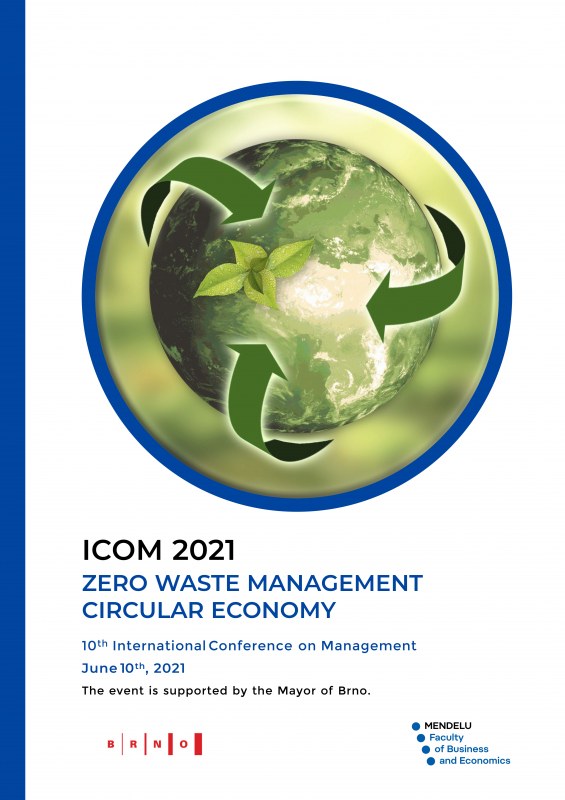
DOI: 10.11118/978-80-7509-820-7-0091
HOUSEHOLDS' WASTE MATERIAL MANAGEMENT AND RECYCLING: HOW MUCH CONCEIVABLE TO SUPPORT A ZERO-WASTE MANAGEMENT
- Arif Ibne ASAD, MD. Sohanur RAHMAN, Samira AKTER
Purpose: The paper aims to understand household waste material management and recycling in Rajshahi City Corporation in Bangladesh and how much the city dwellers can support zero-waste management in the future.
Design/methodology/approach: The investigation was based on a primary survey between 2019 and 2020. Researchers arbitrarily chose 120 family units; respondents were asked to answer a structural questionnaire on households' waste management (HWM), recycling and Perception to attain a zero-waste management goal. The analysis was done through descriptive statistics and logistic regression models.
Findings: The respondents have a sound understanding of the health consequences of waste-related pollution. The logistic regression models demonstrated that education and awareness of households are positive and significantly related to recycling
Research limitations: Difficulties in looking at a randomly chosen holding number and the unwillingness of the household members to clarify their genuine pay level were the few troubles in the research.
Practical implications: The study reveals that 88 % of the respondents were known to HWM beforehand, and 54% concurred to see a moderately vibe of local ambience compared to the past five years.
Social implications: Our study would motivate to attain zero-waste management in the Rajshahi city in future as the households welcomed an approach of recycling, reducing or refusing to buy things with lots of packaging.
Keywords: recycling, household waste management, logistic regression model, Rajshahi city corporation
pages: 91-99, Published: 2021, online: 2021
References
- Abdullah, Z. ,Salleh, S. M., Ismail, K. N. I. K. 2017. Survey of Household Solid Waste Management and Waste Minimization in Malaysia: Awareness, Issues and Practices. International Journal of Environmental & Agriculture Research, 12(3): 38-48.
- Ayšin, E., Kaya, S. K. 2021. Towards the circular economy: Analysis of barriers to implementation of Turkey's zero waste management using the fuzzy DEMATEL method. Waste Management and Research, 39(8): 1078-1089. DOI: 10.1177/0734242X20988781
 Go to original source...
Go to original source... - Babaei, A. A. et al. 2015. Household recycling knowledge, attitudes and practices towards solid waste management. Resources, Conservation and Recycling, 102: 94-100. DOI: https://doi.org/10.1016/j.resconrec.2015.06.014
 Go to original source...
Go to original source... - Chikowore, N. 2021. Factors infuencing household waste management practices in Zimbabwe, Journal of Material Cycles and Waste Management, 23: 386-393.DOI: https://doi.org/10.1007/s10163-020-01129-9
 Go to original source...
Go to original source... - Cole, C. et al. 2014. Towards a Zero Waste Strategy for an English Local Authority. Resources, Conservation and Recycling, 89: 64-75. DOI: http://dx.doi.org/10.1016/j.resconrec.2014.05.005
 Go to original source...
Go to original source... - Colona, M., Fawcett, B. 2006. Community-based household waste management: Lessons learnt from EXNORA's 'zero waste management' scheme in two South Indian cities. Habitat International, 30: 916-931. DOI:10.1016/j.habitatint.2005.04.006
 Go to original source...
Go to original source... - European Commission Environment, Consumers & Health. 2021. Benefits of a Zero Waste Economy (Circular Economy). ECOS. [Online]. Available at: https://www.ecos.ie/benefits-zero-circular-economy/ [accessed: 19.05.2021].
- Graham-Harrison, E., Doshi, V. 2016. Rajshahi: the city that took on air pollution - and won. The Guardian. [Online]. Available at: https://www.theguardian.com/world/2016/jun/17/rajshahibangladesh-city-air-pollution-won/ [accessed: 19.05.2021].
- Gray, A. 2017. Germany Recycles More than any Other Country. World Economic Forum. [Online]. Available at: https://www.weforum.org/agenda/2017/12/germany-recycles-more-than-any-other-country/ [accessed: 19.05.2021].
- Matete ,N., Trois, C.2008. Towards Zero Waste in emerging countries - A South African experience. Waste Management, 28: 1480-14. DOI: https://doi.org/10.1016/j.wasman.2007.06.006
 Go to original source...
Go to original source... - Siddiqi, M. M. et al. 2020. Exploring E-Waste Resources Recovery in Household Solid Waste Recycling. Processes, 8(9): 1047. DOI: https://doi.org/10.3390/pr8091047
 Go to original source...
Go to original source... - UNDP. 2018. Sustainable Solutions to Solid Waste Project. Available at: https://www.linkedin.com/posts/undpbangladesh_sustainable-solutions-to-solid-waste-in-coxsactivity-6801934103353663488-MwtA [accessed: 29.06.2021].
- Xu, L. et al. 2016. Path analysis of factors influencing household solid waste generation: a case study of Xiamen Island, China. Journal of Material Cycles and Waste Management, 18: 377-384.
 Go to original source...
Go to original source... - Zaman, A. U. & Lehmann, S. 2011a. Urban growth and waste management optimization towards 'zero waste city'. City, Culture and Society, 2(4): 177-187. DOI: http://dx.doi.org/10.1016/j.ccs.2011.11.007
 Go to original source...
Go to original source... - Zaman, A. U., Lehmann, S. 2011b. Challenges and Opportunities in Transforming a City into a "Zero Waste City". Challenges, 2:73-93. DOI:10.3390/challe2040073
 Go to original source...
Go to original source... - Zaman, A. U. 2014. Identification of key assessment indicators of the zero waste management systems, Ecological Indicators, 36: 682-693. DOI:10.1016/j.ecolind.2013.09.024
 Go to original source...
Go to original source... - Zero waste Blog. 2020. Who started the zero-waste movement? Zerowaste [online]. Available at: https://www.zerowaste.com/blog/what-is-it-who-started-the-zero-waste-movement/[access date: 19.05.2021].
- Zorpas, A. A. et al. 2015. Household waste compositional analysis variation from insular communities in the framework of waste prevention strategy plans. Waste Management, 38: 3-11. DOI: http://dx.doi.org/10.1016/j.wasman.2015.01.030
 Go to original source...
Go to original source...


